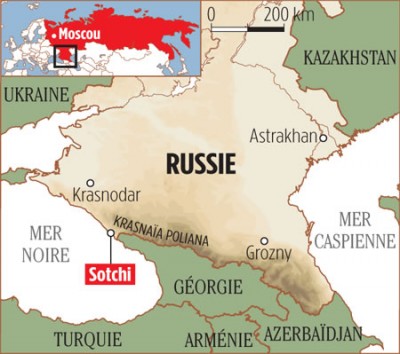Sochi: Bringing Olympic Spirit back to the Games. The West’s Media Campaign against Russia

As the Olympic torch draws closer to Sochi, an international media campaign is in full swing, attempting to question Russia’s ability to provide a safe and tolerant environment for the athletes and guests of the Winter Olympics.
Setting aside the issue of whether the complaints about Russia’s human rights record or the alleged terrorist threats in Bigger Sochi region are legitimate, we should point out a couple of official goals of Olympism according to the Olympic Charter:
“Promoting a peaceful society concerned with the preservation of human dignity” (item 2) and
“Any form of discrimination with regard to a country or a person on grounds of race, religion, politics, gender or otherwise is incompatible with belonging to the Olympic Movement” (item 6).
Therefore a respectful attitude towards any nation participating (to say nothing about hosting) the Olympics should be an integral component of what we call the Olympic spirit. It seems this rule is kept when the torch is about to hit the streets of London, Vancouver, Salt Lake City or Sydney, despite the wealth of opportunities to mourn the exterminated native Britons, Indians, and Aborigine tribes.
Even the 1936 Summer and Winter Games organized in Berlin by the Sports Office of Nazi’s Third Reich were considered to be quite in keeping with the Olympic Charter despite racist “Reich Citizenship Law” and the “Law for the Protection of German Blood and German Honor”, adopted by the Reichstag in September 1935. For the global powers of the time (UK&US), over half a million German Jews being instantly stripped of their citizenship was not a sufficient pretext to suspend two (!) Olympic events in a country that would wage a world war in less than three years!
In contrast, the 1980 Moscow Summer Olympics were unilaterally boycotted by the Western countries, undermining the basic principles of Olympic Charter for the first time in modern history. Given the latest confessions by Zbigniew Brzezinski about CIA’ role in making Soviet military contingent enter Afghanistan and consequent launch of anti-Soviet Al-Qaeda project, the pharisaical US-inspired boycott in 1980 today looks even more disgusting in retrospect.
Another dimension of hypocrisy was evident quite recently, on the very day of the opening of the 2008 Beijing Olympics, when a provocative bloody move against South Ossetia was ordered by the former Georgian president Mikhail Saakashvili, who undoubtedly secured Washington’s blessing in advance. The offensive anti-Russian media hysteria that spoiled the Beijing Olympics that year was later revealed to be absolutely baseless and slanderous. Who was called to account for that? Who apologized to the Russian people and the befuddled international community?
On the contrary, the same people are now leading from behind a number of international “initiative groups” anxious about the “violation of gay rights” in Russia, regional security challenges, the fate of the allegedly “oppressed” local minorities and even “excessive Russian public spending on Sochi Olympics”. There seem to be no reasonable limits for malicious minds indeed.
All these claims have been thoroughly rejected (for details read here, here, here and here). The forthcoming Games promise an outstanding athletic exhibition in brand-new facilities built using the state-of-the-art technology. This will be the first chance for the most powerful winter athletes of the world to face each other on Russian soil, for thousands of guests to experience Russia’s legendary hospitality and beauty, and for a global audience of billions to discover a New Russia: a modernized, inspiring, ambitious, charming, and friendly civilization.
It is certainly a Sochi time to definitely close the regretful era of politicized Olympics in favor of a respectful and honest athletic competition of the nations of the world.
Welcome to Sochi! Let’s bring back the genuine Olympic spirit to the Games!
Dozens of other infrastructural projects in Sochi like water percolation systems, hi-speed fiber-optical channels, new gas pipelines etc necessary for the development of the area, were not presented in the photo report.
Photos courtesy of Sdelanounas.ru
Copyright The Oriental Review 2014

























